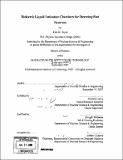Dielectric liquid ionization chambers for detecting fast neutrons
Author(s)
Boyd, Erin M
DownloadFull printable version (19.06Mb)
Other Contributors
Massachusetts Institute of Technology. Dept. of Nuclear Science and Engineering.
Advisor
Richard Lanza.
Terms of use
Metadata
Show full item recordAbstract
Three ionization chambers with different geometries have been constructed and filled with dielectric liquids for detection of fast neutrons. The three dielectric liquids studied were Tetramethylsilane (TMS), Tetramethylpentane (TMP), and Isooctane, which each have intrinsic properties that make them attractive for fast neutron detection. Their electronic properties are similar to those of condensed noble gases, but they don't require cryogenic temperatures to maintain liquid phase. However, like condensed noble gases, they do require a high level of purity. A stainless steel purification system was constructed to purify the liquids and the purity was monitored by an ionization chamber with a 241Am source inside. The three liquid detectors were exposed to 250keV x-rays from an orthovoltage x-ray tube and neutrons (1.4-12MeV) from a 1-Ci 239Pu-Be source. Experimental data show that an ionization chamber filled with dielectric liquid is capable of detecting fast neutrons in pulse mode. While chamber 1, chamber 2, and chamber 3 (filled with TMS) did not respond to the Pu-Be source, chamber 3 (filled with TMP and Isooctane) successfully detected the presence of neutrons. Data also show that the chambers could not detect gamma rays from 1[mu]Ci Co-60 and Cs-137 check sources. In addition, the chambers could detect 250 keV x-rays in current mode, but not pulse mode. These results present positive implications for the gamma-blindness of the dielectric liquids studied.
Description
Thesis (S.M.)--Massachusetts Institute of Technology, Dept. of Nuclear Science and Engineering, 2008. "September 2007." Includes bibliographical references (leaves 99-100).
Date issued
2008Department
Massachusetts Institute of Technology. Department of Nuclear Science and EngineeringPublisher
Massachusetts Institute of Technology
Keywords
Nuclear Science and Engineering.